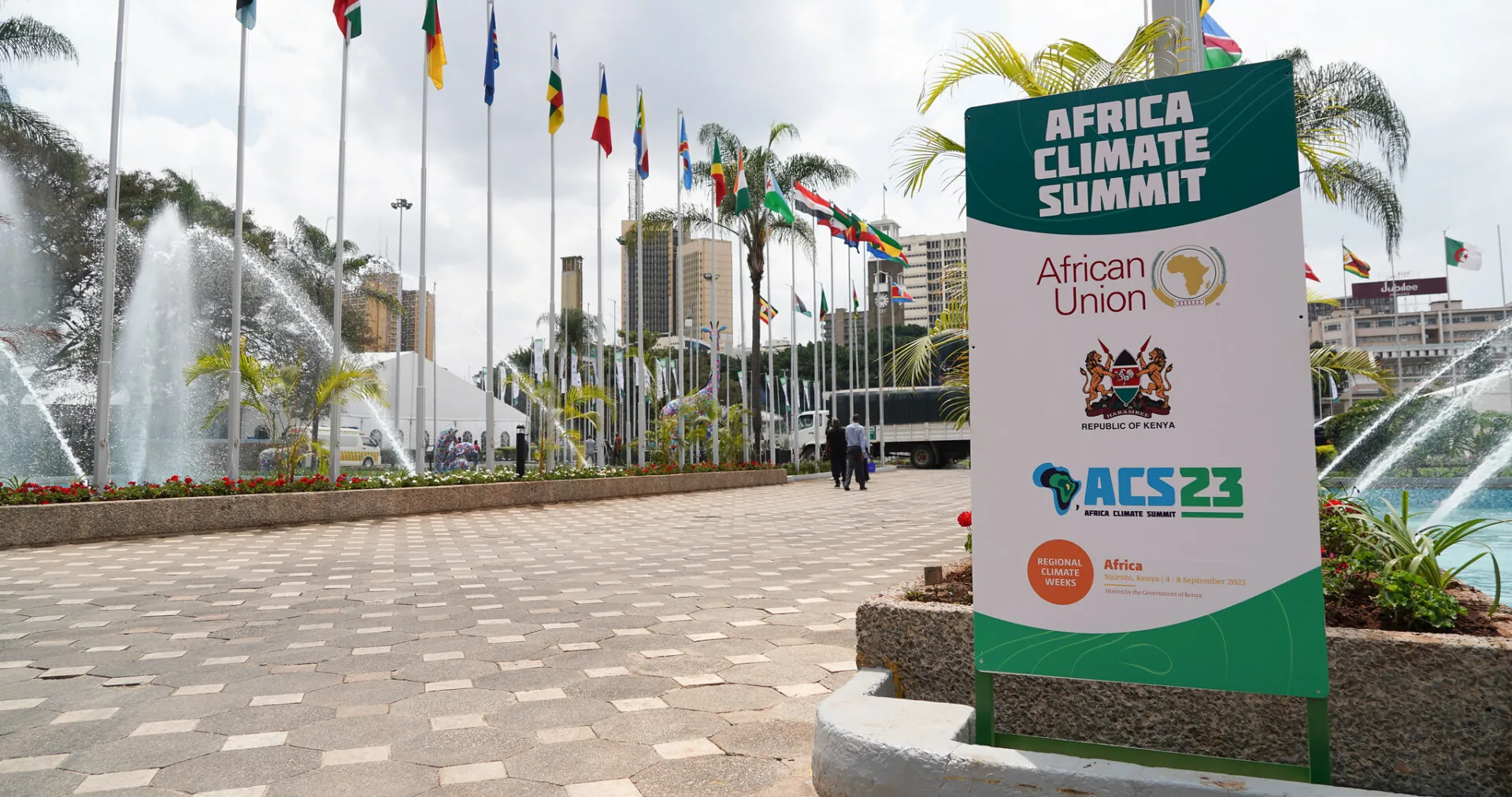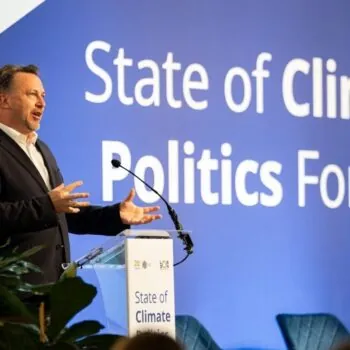African leaders gathered in Nairobi from 4-6 September for the inaugural Africa Climate Summit. This Summit was notable – indeed historic – as the first major international climate summit to be hosted and led by leaders from the Global South.
It picked up many of the key themes of June’s Paris Summit for a New Global Financing Pact – where African leaders had displayed much of the energy and new thinking on reforming the international financial architecture – while reframing the climate finance discussion to focus on developing countries’ urgent priorities, including the pressing issue of debt.
Significance
The Africa Climate Summit was well-attended by African Heads of State and Government, as well as the President of the European Commission and Secretary General of the UN. Against a backdrop of tensions in other areas of the continent, particularly following the recent coups in Niger and Gabon, there was a strong sense of pan-African solidarity on climate and the continent’s relations with wealthier nations.
Africa’s green growth potential was a major theme throughout the summit, and African leaders’ duty to their citizens to take advantage of this opportunity was stressed. Finally, there were strong calls for urgent climate action, public and private investment mobilisation, and a fairer global financial system fit-for-purpose in the 21st century.
Kenyan President William Ruto led calls for fast-tracking green growth, highlighting Africa’s “untapped renewable energy potential” and its growing, young workforce, sentiments echoed by other leaders. Green industrialisation and technological innovation, with a strong focus on youth entrepreneurialism, have become core priorities for President Ruto and the Committee of African Heads of State and Government on Climate Change (CAHOSCC), which Ruto chairs. African leaders continued to emphasise the need to emphasise development challenges, and, in setting ambitious goals for renewable energy expansion, the scale of financing required to transition from fossil fuels and meet Africa’s energy needs.
Leaders emphasised Africa’s central role and potential for the global acceleration of renewable energy. In the Nairobi declaration, leaders committed to a five-fold increase in renewable energy capacity by 2030, from 56 to 300 GW.
The International Renewable Energy Agency (IRENA) pledged to increase renewable energy in Africa, in partnership with Kenya, Denmark, UAE and Germany. The Accelerated Partnership for Renewables in Africa (APRA) includes Kenya, Ethiopia, Namibia, Rwanda, Sierra Leone, and Zimbabwe, and will focus on mobilising finance, providing technical assistance and capacity building, and engaging the private sector.
The UAE announced a $4.5bn pot to leverage an additional $12bn for investment in renewables in Africa (see New Financing Commitments). Some scepticism exists about the feasibility of this leverage ratio.
China launched an ‘African Solar Belt Program’, committing $13.7m for solar projects in regions not served by power grids to support around 50,000 households.
Leaders emphasised the abundance of Africa’s natural resources to meet the continent’s energy needs and support the global energy transition to clean energy. The Nairobi declaration emphasised the need to shift “the energy intensive primary processing of Africa’s raw material exports to the continent.” Also, the summit provided space to further discussions of the Africa Green Minerals Strategy.
However, there was little acknowledgement of the ramifications of mining on communities and their ecosystems, the potential for these ramifications to worsen with the acceleration of renewable energy development, nor the vital need to develop effective resource governance systems.
Germany announced a $65m debt swap with Kenya for clean energy projects. However, there has been little progress beyond ongoing calls for debt relief. No African countries have announced they will join the Sustainable Debt Coalition, nor the Expert Review on Debt, Climate and Nature, though support for these initiatives was included in the Nairobi Declaration alongside continuing criticism of credit rating agencies.
African leaders called for an acceleration of ongoing efforts to reform the international financial architecture to deliver the scale and quality of financing required to support the continent’s net zero transition. Particular emphasis was placed on rapid implementation of the structural reform priorities outlined in the Bridgetown Initiative, the Accra-Marrakech Agenda, the UNSG’s SDG Stimulus Proposal and the IFA reform roadmap set out at the Paris Summit for a New Global Financing Pact.
President Ruto also called for a new issuance of Special Drawing Rights (SDRs), which could, potentially, rebalance access to these critical reserve assets. At the same time, no tangible progress was made on the African Development Bank’s (AfDB) proposals to recycle countries’ SDRs through an innovative hybrid capital mechanism.
The largest new financing commitment was made by the UAE, who pledged $4.5bn to develop renewal energy across Africa to develop 15GW of clean power by 2030. This included $1.5bn in concessional finance (including $500mn in credit insurance) and $3bn in equity investments from UAE’s state-owned Masdar renewables firm and AMEA Power, which the UAE claimed would mobilise an additional $12bn in private investment in the African energy sector.
The AfDB announced that it would spend $23bn for green growth, mitigation and adaptation efforts by 2025. Together with the Global Centre on Adaptation, the AfDB launched a $1bn initiative to finance youth businesses and startups across Africa. The Bezos Earth Fund announced $22.8m towards restoration of essential carbon sequestration landscape areas in Kenya, DRC Congo, Rwanda, and Burundi. Mentions of the Nigerian Just Energy Transition Partnership in ongoing negotiations with interested parties.
There were limited new financing commitments from others. Between them, Germany, the US, UK and European Commission announced around $700m in commitments for a variety of mitigation-focused projects, although it is unclear how much of this is genuinely new money. However several smaller EU member states made significant new commitments, including $203m from Denmark towards the Africa Green Climate Fund by 2027; $25m from Norway for Ethiopia’s forest sector; $24m from Belgium for climate adaptation projects in the next two years, and a £25m cooperation agreement with Mozambique; and €400m in guarantees from Portugal to support investments in priority sectors in six African countries.
Shifting away from the Global South / North divide of ‘donors’ and ‘recipients, Kenya announced $49.7m in funding for regional county partners through the Financing Locally-Led Climate Action Program (FLLoCA). Further, the African Heads of State Panel for the Development of a Regenerative Blue Economy and implementation of the Great Blue Wall Initiative was created with the aim to mobilise at least $15bn by 2030.
African countries raised hopes of using the Loss and Damage fund to support these commitments. While the Loss and Damage fund and adaptation financing were not prominent asks, there was a unified call for its implementation, with US Special Envoy John Kerry emphasising its role and operationalisation ahead of COP28.
Numerous African leaders called for the adoption of a global carbon taxation regime to finance climate adaptation and capitalist the UNFCCC’s Loss and Damage fund. Proposals included a carbon tax on the fossil fuel trade, maritime transport, and aviation. Some leaders also called for a global financial transaction tax. However, there are divisions within African countries on the realistic prospects for securing new global taxes, including a shipping levy at the International Maritime Organisation, and strong opposition to carbon taxes from many G7 countries.
The UAE Carbon Alliance, a new coalition of private sector actors, announced a non-binding agreement to buy $450m of carbon credits by 2030 from the African Carbon Markets Initiative (ACMI). Climate Asset Management, a private investor group, also announced a $200m commitment to purchasing ACMI carbon credits.
Some African leaders, including President Ruto, support growing the carbon credit market, while other African voices, especially within civil society groups, are opposed. Critics see carbon markets as a ‘neocolonial’ policy, allowing polluters to continue polluting through purchasing carbon credits to offset emissions and shifting the burden of action to Africa.
The draft Nairobi Declaration calls on the global community to “uphold commitments to a fair and accelerated process of phasing down coal and phase out of inefficient fossil fuel subsidies”. This does not go further than what was agreed in 2021 at COP26, even amidst ongoing efforts to extend the commitment to all fossil fuels, including oil and gas.
The summit largely avoided discussion of or action on fossil fuels. However, Akinwumi Adesina, AfDB President, emphasised the ongoing need for many African countries to use gas as part of their energy mix alongside renewable energy, and the IEA and AfDB released a joint Clean Energy report that stated that “Africa must also be given time to transition and allowed to use its natural gas as a transition fuel.”
Conclusion and next steps
The Africa Climate Summit represented a shift in Africa’s involvement in global climate action, where high-level attendance and participation demonstrated the continent’s active leadership. Some progress remains to be made. Divisions on the continent, for example on fossil fuels and global taxes, remained clear. However, these disagreements did not detract from the unified and progressive stance that African leaders displayed across the Summit.
Now, wealthier nations need to listen to the demands made in Nairobi on issues from reform of the governance structures of international financial institutions to ramping up financing for clean energy. New commitments from traditional donor countries fell short of expectations and failed to meet the scope of the challenge. The G20 Leaders’ Summit, the World Bank and IMF Annual Meetings and COP28 provide a chance for these countries to course correct.



